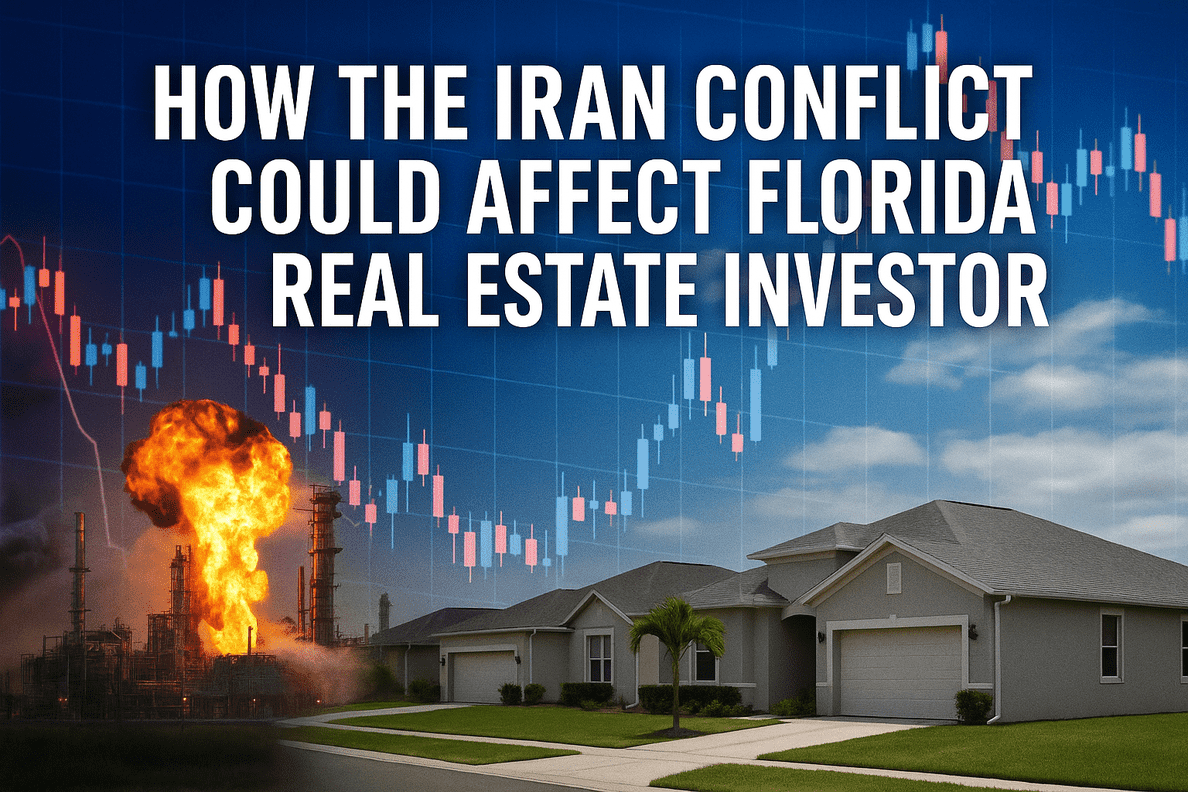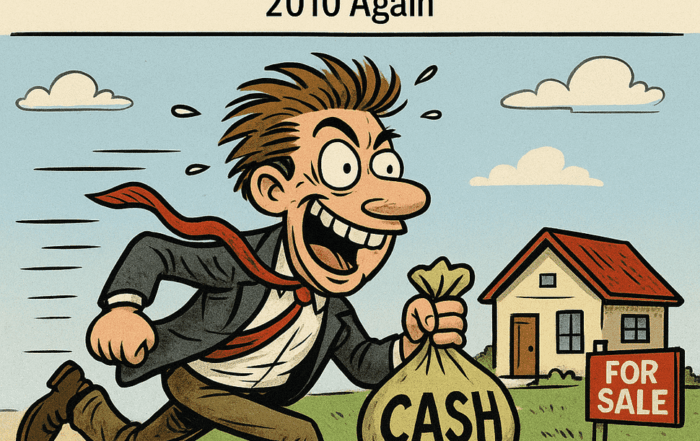
Let’s talk about what happened this week—because if you’re a real estate investor in Florida, it matters more than you think.
This morning, the U.S. military coordinated with Israel to launch a direct strike on Iranian nuclear sites. These weren’t warning shots—these were bunker-busting, mission-critical bombings on strategic locations. Iran, in response, launched a wave of drones and missiles back at Israel. Oil prices jumped. Gold went up. Stock markets dipped. Global tension skyrocketed.
You might be wondering—how does something happening thousands of miles away affect my real estate investment strategy in Central Florida?
Here’s the truth: It affects everything. Interest rates. Building costs. Buyer behavior. Seller motivation. Foreign investment. Market timing. And above all—it affects investor psychology.
Let’s unpack this like we would on a deal review call: no drama, just facts and strategy.
1. Mortgage Rates Will Likely Stay High, If Not Go Higher
Let’s start with the cost of money. In times of global tension, markets get nervous. Nervous markets = inflation concerns. And inflation concerns = the Fed slamming the brakes on interest rate cuts. They might even raise rates again.
That’s not theoretical—it’s already in motion. With oil prices jumping overnight and fears of supply chain shocks, inflation indicators are creeping back up. The 10-year Treasury, which influences mortgage rates, is reacting fast.
So what does that mean for you as a Florida investor?
-
Buyers can afford less. If they were qualified at 6.5% but now it’s 7.25%, that’s tens of thousands off their buying power.
-
Your exit strategy shifts. That $400K flip you planned might need to sell for $375K if rates spike.
-
Cash flow properties tighten up. Every half-point in interest could wipe out $100–$300 per month in cash flow depending on the loan size.
Bottom line: You’ve got to underwrite more conservatively right now. Leave room for rates to stay high. Don’t assume tomorrow’s rates will save today’s thin deal.
2. Construction Just Got More Expensive—Again
When war or sanctions touch the Middle East, global supply chains suffer. Even if the fight is regional, the economic ripples are worldwide.
Expect delays and rising costs in:
-
Steel (Middle East is a major exporter of raw materials)
-
Drywall and insulation (China, affected by regional shipping concerns)
-
Appliances (already delayed, now possibly worse)
-
Fuel surcharges on everything from concrete delivery to demo crews
We’ve seen this before. During COVID, we saw lumber jump 300%. During the Russia-Ukraine war, energy prices spiked. This time, it’s not a new virus or Eastern Europe—it’s the Middle East, and it’s oil.
If oil crosses $100/barrel, you’ll see:
-
Higher shipping costs
-
Higher materials prices
-
Less price certainty from vendors
-
Potential project slowdowns due to contractor scheduling disruptions
If you’re flipping or building, I’m telling you right now—get your bids locked, your crews secured, and your material orders placed. Waiting two weeks could cost you two grand or more per unit.
3. How Investors Feel in Moments Like This
This is the part most people don’t talk about—but it’s what I see every time.
You can have all the spreadsheets, calculators, and market forecasts in the world. But when missiles are flying and headlines are red, investors feel it in their gut. And the gut doesn’t always follow logic.
Here’s what happens:
-
Newer investors freeze. They stop making offers, they delay closings, and they lose deals that were solid—just because of fear.
-
Intermediate investors start overanalyzing. They re-run their comps five times a day. They tweak exit assumptions until every deal looks bad.
-
Veteran investors go quiet—and start buying. They know moments of panic bring discounts. They also know that wealth transfers when people are afraid.
I had a conversation with one of our VIP investors this morning. He said, “Jorge, I’m getting nervous—should I pause?” And I said:
“No, you pivot. This is when we move carefully, not when we stop moving.”
War headlines aren’t a reason to abandon real estate. They’re a reason to lean into the fundamentals: equity, cash flow, location, risk management.
You don’t win by avoiding risk—you win by understanding it.
4. Florida Will Stay Strong—Especially in the Center
Now let’s talk location. While some coastal markets are tied to international volatility (Miami, Fort Lauderdale, parts of Tampa), much of Central Florida is driven by domestic migration, stable employers, and long-term renters.
People still want to move here. Retirees still want sunshine. Families still want good schools. Tech workers from California still want affordable homes. That hasn’t changed—and it won’t change because of a war on the other side of the planet.
In fact, in uncertain global times, Florida becomes more attractive, not less. Investors looking to pull money out of volatile stocks or shaky markets may rotate into real estate—and Florida’s cash flow markets (like Ocala, Lakeland, Kissimmee, Clermont) become even more appealing.
I’ve been through it before. After 9/11, after the 2008 crash, and again after COVID—the same pattern played out. People moved to Florida. People invested here. Our markets didn’t crash—they corrected, then surged.
This might be the start of the same pattern.
5. Foreign Investment May Slow Temporarily
This is where Miami and luxury condos take a hit. Many foreign investors—especially from Latin America, Europe, or the Middle East—pull back when there’s geopolitical risk.
Why? Three reasons:
-
Travel uncertainty
-
Currency fluctuation
-
Political fear back home
That means:
-
Some deals won’t close
-
Some condo buildings might see price drops
-
High-end Airbnb properties may see slower bookings
But if you’re an investor in more affordable long-term rental markets, this shift doesn’t hurt you—it helps. It reduces competition and opens doors to off-market deals that were previously locked up.
6. Seller Motivation Just Ticked Up
Here’s something else to watch—seller behavior.
In times of global stress, people reevaluate their holdings. That second home they were planning to Airbnb might now feel like a liability. That condo they were waiting to list might suddenly hit the market as a fire sale.
We’re already seeing motivated sellers who want cash in hand instead of waiting out uncertainty. That means more creative financing, more subject-to opportunities, and more seller-financed options coming to the table.
If you’re plugged into the right agent network, wholesaler circles, and off-market groups—you’re going to see some serious value pop up this month.
7. What I Told My Team and My Students
If you’re part of my team, you’ve probably already heard me say this—but it’s worth repeating:
“Scared money doesn’t make money. But smart money makes it last.”
This is not the time to disappear. It’s not the time to take wild risks either. This is the time to:
-
Sharpen your numbers
-
Secure your capital
-
Reconnect with your lead sources
-
And double down on discipline
I’m telling my acquisitions team to expect more calls from wholesalers with “urgent” deals. I’m telling my PM team to watch rent payments closely over the next 60 days. I’m telling my coaching students to stay out of analysis paralysis and focus on action.
This is where portfolios are made—or lost.
8. Your Action Plan for the Next 30–90 Days
Let’s close with some tactical moves. Here’s what I’d tell any investor right now, whether you’ve got 2 doors or 200:
-
Re-run your deal analysis at 7.5%+ interest rates. If it still works—it’s a good deal.
-
Call your contractors and vendors. Ask about material availability. Get quotes locked in.
-
Check your financing timelines. Don’t assume you’ll close in 30 days. Build in 45.
-
Diversify your portfolio geography. Don’t get stuck only in beach towns or luxury zip codes.
-
Stay liquid. Cash will be king again in the next 3–6 months if this continues.
-
Tighten up your leasing standards. War tension often means job market uncertainty. Vet your tenants well.
-
Expect motivated sellers. Be ready with offers and flexible terms.
This isn’t a time for fear. It’s a time for focus.
What Other Investors Are Saying 💬
To get a feel for how the community’s reacting, I checked in on the BRRRR Invest Facebook thread after the Iran situation unfolded. The responses were everywhere—serious, sarcastic, confused, and strategic. Here’s the breakdown:
-
30% said “Yes, we should be worried.”
They expect oil-driven inflation, rising interest rates, maybe even real estate pain—and the fear talk is real (“sell everything now,” “prepare for bankruptcy”). -
25% joked it off.
Think “I’ll buy your house at 50% off” or “Invest in Iran STRs.” For some, humor is the best way to cope with uncertainty. -
20% said “No panic.”
These investors stayed calm and strategic. One reminded the group, “Fortunes are made in downturns.” -
15% were clueless.
A surprising number were like, “Wait—what even happened?” That’s how fast news travels—and how unclear its impact can feel. -
10% offered sharp analysis.
They talked about oil disruptions, inflation, interest rates, geopolitical risk—and possibly discounted opportunities.
Bottom line:
Some are panicking. Others are shopping for deals. Some are just trying to understand the news. And a few are quietly prepping to pounce.
I’ve seen this before—2008, COVID, and now. My take? Headlines don’t dictate your strategy. Your plan does.
Keep it consistent, stay patient, stay true—if I did it, so can you.
Final Thought: Discipline Wins During Uncertainty
We’ve all seen this movie before. The world gets messy, people panic, and the media plays it like a drumbeat. But the experienced players? They keep moving.
If you’re buying smart, holding quality properties, and managing your debt, you’ll be fine. In fact, you might come out ahead. Because the chaos always passes. And the ones who stayed consistent through it? They’re the ones who scoop up the deals, the cash flow, and the equity growth.
Don’t overreact. Don’t under-prepare.
Be ready.
Keep it consistent, stay patient, stay true—if I did it, so can you.
This is Jorge Vazquez, CEO of Graystone Investment Group and all our amazing companies, and Coach at Property Profit Academy. Thanks for tuning in—until the next article, take care and keep building.
Pick your expert. Book your free 15-minute consult now. We are here to help!
Our Top Articles
How Does a Property Flipper Make a Profit in 2025?
Jorge Vazquez2025-07-11T20:16:48+00:00July 11th, 2025|Comments Off on How Does a Property Flipper Make a Profit in 2025?
How Does a Property Flipper Make a Profit in 2025? By Jorge Vazquez, CEO of Graystone Investment Group It's [...]
The College Rental That Nearly Schooled the Landlord: Lessons from Bradley’s Student Housing Fiasco
Jorge Vazquez2025-07-10T19:32:35+00:00July 10th, 2025|Comments Off on The College Rental That Nearly Schooled the Landlord: Lessons from Bradley’s Student Housing Fiasco
A "Safe Bet" Gone Sideways Bradley is one of those agent-investors we all admire. Sharp, experienced, hands-on, [...]
Opportunistic Buyers Are Back: Why Florida’s Real Estate Market Feels Like 2010 Again
Jorge Vazquez2025-07-09T01:10:13+00:00July 8th, 2025|Comments Off on Opportunistic Buyers Are Back: Why Florida’s Real Estate Market Feels Like 2010 Again
If you were around during the aftermath of the 2008 crash, you might remember that eerie silence around 2010—the [...]
Property Profit Academy:
✔ Learn to buy properties with little to no money down.
✔ Build a $10M portfolio step by step.
✔ Master strategies like BRRRR and house hacking.









